- Home
- Alex Segura
Down the Darkest Street
Down the Darkest Street Read online
DOWN THE DARKEST STREET
A Pete Fernandez Mystery
Alex Segura
“The past was filling the room like a tide of whispers.”
—Ross Macdonald, The Instant Enemy
CHAPTER ONE
Pete Fernandez didn’t see the kick coming. The boot crashed into his jaw, sending him farther into the dank alley. The two men paused to see if Pete had any plans to fight back. He didn’t. He felt blood trickle down his face.
Pete tried to stand up. His feet gave way. He slipped and landed on his ass, slamming into the metal garbage cans that lined the alley. He wasn’t sure where the pain was coming from anymore. The Miami air felt thick and heavy around him. His breathing was fast. Short, quick gasps.
Bile rose in Pete’s throat. He could taste some of the Jim Beam shots he’d downed over the course of the evening. He tried to wipe some of the sweat—and whatever else—from his face, but stopped when he caught a glimpse of his hand. Shaking and bloody, gravel and dirt embedded in his left palm.
One of the guys laughed as the other walked up and grabbed Pete, lifting him up by his shirt. The guy reeked of cheap beer and cheaper aftershave. He spit a wad of mucus at Pete’s face, most of it splattering on his left cheek. The guy let Pete drop and turned toward his friend.
Pete watched the duo lumber away, their curses muffling the sound of their footsteps. He wiped the gunk off his face and let out a jagged breath.
It had been another Miami scorcher. One of those days where you don’t want to consider leaving the house, or wearing pants. Where you get sunburned taking out the garbage. Where your shirt sticks to your slick body before you even get to your car. Pete’s phone had said ninety degrees that morning but it felt closer to a hundred. The evening had only brought a small respite—dimmed lights in a sauna. The rare, tropical breeze a teasing gift—a sweet whisper in your ear. Miami. Even the brightest sun and neon lights couldn’t change it. The place was fucked. Dirty. Corrupt. A nightmare happening in broad daylight.
Pete was on all fours now. His head hung down. A quick cough turned into a dozen and soon he was lying on his side, spittle dripping out of his mouth, his eyes out of focus and his body writhing in the dirt.
He tried to get up, his vision blurring. He got his footing and paused to catch his breath, his body leaning on the grime-covered wall. He tried to concentrate. On his hand pushing himself off the wall and toward the end of the alley. On each foot—left, right, left—as he started to walk. On what had led him back here, outside the Gables Pub, bloodied, drunk, and alone.
The night had started off routine. Standard. Pete needed to get out. Do some reading. His friends weren’t around anymore. He didn’t care. Fuck ’em. He was fine sitting at his favorite bar, reading his dead father’s worn copy of Night Shift. Shuffling the pages back every few minutes, having forgotten what he’d read, too proud to give up. The pub was on the fringe of what people considered Coral Gables—meaning it wasn’t as nice as the mansions and high-rise buildings that meshed with the tiny city’s old Spanish décor. Just a few miles from Miracle Mile, the pedestrian-friendly heart of the Gables, the pub felt like another world: dark, dirty, and out of place. Time passed. He had a few whiskey shots to go with his seven or eight beers and felt rough. Not smooth, like he used to feel after a few rounds, when the buzz glowed around his face and made him smile without thinking about it. No, he felt rough and grimy, like bare feet on a dirty sidewalk.
The two guys were big, but not built. Ex-frat boys with nothing to do but get wasted on a Tuesday night. The television perched over the bar was playing Dolphins football highlights from the night before. Jets 35, Dolphins 7. The two guys and their girlfriends were a few seats away at the other end of the bar, cursing at the screen. Pete found what little concentration he had disrupted. He put his book down and scowled at the double date. They shrugged and kept yapping. Pete groaned and ordered another round. Beer and a shot. The whiskey went down warm. He could feel it coating his throat and stomach.
Next thing he knew, he was sitting next to one of the women, his hand on her leg. Where were the guys? He wasn’t sure. Whatever. The other girl—chunkier, louder, obnoxious—was yelling something. She seemed upset. Pete swayed. He tried to play off how drunk he was to the girl, tried to make it seem intentional. His hand went too far. She tossed it off. He tried to stand up, one hand on the bar, his other swinging a bottle of Heineken around. That’s when he felt a hand gripping his shoulder. He remembered being pushed out the front door and into the street. It was the two guys. He’d thought they had left. Wrong.
Pete remembered mumbling an apology, but that was lost. Lost in the noise of the two guys yelling and lost as he felt himself being shoved into the alley. It was narrow and wet, dark and empty. That’s when he felt the first kick to his midsection. He was splayed on the ground, and trying to get himself back to standing only resulted in a weird push-up. The second kick hit him in the face.
Pete now tried to will the memory away but failed. He wiped his wrist over his mouth and found more blood.
He inched down the alley, away from the pub, toward the backstreets that would allow him some semblance of cover from the shame he knew was starting to kick in. He moved his tongue around his mouth, checking for missing teeth. Relieved to find there were no unwanted gaps.
He reached the end of the alley. Pete had parked his banged up Toyota Celica on the street a few blocks north of the bar, past a small parking lot. It was dark enough outside—a few hours past sunset—that he could limp to his car and not make too much of a scene.
He didn’t see any people or cars. Pete let go of the alley wall and began to half walk, half hobble across the street that intersected with the end of the alley. He was out of breath by the time he crossed the street and stopped to lean against the short cement wall surrounding the parking lot.
The sound of an engine cut through the quiet evening.
Pete turned to meet the noise. A van was approaching from his left, the clank-and-growl sound coming from under its hood getting louder as it approached. He stepped back. His first thought was that the two guys were back, this time with wheels. The van was close enough to Pete that he wasn’t sure he could risk darting back across the street. He was also unsure he could “dart” anywhere. His head throbbed and the pain in his side had become sharper. He considered the hospital for a second but pushed the thought out of his mind. He just wanted to get home.
The van was now close enough for Pete to see inside. He let his eyes wander over it, his vision lazy and blurry. As the van came up beside him, the driver came into focus—a tall, thin white man with longish brown hair. Pete couldn’t tell much else about him in the darkness. The driver didn’t notice Pete, watching the road instead. But then the van stopped for a second. Pete and the driver looked at each other. The driver nodded his head. He thought Pete wanted to cross the small street—which he had, but the arrival of the van threw him off. Pete motioned for the van to continue. At first he’d only noticed the driver, but as the vehicle drove on past him, Pete realized there was another passenger—a teenager, curled up in the front seat. The girl was petite—couldn’t be over sixteen, Pete figured—and her hair looked rumpled and disheveled.
Pete stepped back. The evening’s silence was replaced by the sound of rubber tires on asphalt, as the van accelerated and was gone.
CHAPTER TWO
His hands tightened on the steering wheel. A bead of sweat formed at the edge of his scalp. The drunk man had caught him off guard, stepping into his path like that. The last thing he needed was to hit a pedestrian and make a scene. No matter. They were almost at the spot. The Voice would be appeased and grow quiet again.
The girl was splay
ed out on the passenger side, her head at a weird angle. He noticed the bloody smear at the base of her skull. He hadn’t wanted to do that, but she would have fought. She would have screamed. He thought back to a few hours earlier. Dadeland Mall—a giant eyesore located in suburban Kendall in southwest Miami. A giant block of stores and restaurants that looked more like a prison than anything entertaining. He’d followed the girl and her friends. They were window-shopping. Eating at the food court. The usual. He’d wooed her for days via e-mails, Facebook messages, and the occasional text message. His method hadn’t failed him. He was cautious.
He turned the van onto the expressway, heading south.
After a while, her friends had left. She needed a ride home. He texted her from the disposable phone he’d purchased that morning. From “my friend’s phone.” Meet me outside, we can get a soda. She was hesitant. He watched from the van. The only thing he’d held onto since the darker times. Since New Jersey. Virginia. Georgia. He changed the signage on the side every month or so. Some months he was MONSON ELECTRIC. Other months, it was ANDREA’S BRIDAL.
He spotted her standing outside of Macy’s, near the Lot C parking lot, alone. He got out of the van and approached her from behind. He tapped her on the shoulder. She turned around with a start, a confused look on her face.
“Excuse me, young lady?”
“Yes?”
“I’m Steve’s uncle. Have you seen him? He said he was meeting a friend.”
She looked concerned.
“Oh, well, he said he was going to meet me here,” she said, with no prodding.
“That’s not like him not to show up,” he said, his hands sliding into his jeans pockets. “Weird. I dropped him off here a little while ago.”
She shrugged her shoulders and checked her phone. Nothing from “Steve.”
“Have you spoken to him recently?”
“Just a few minutes ago.”
“Hmm,” he said, rubbing his chin. He’d cleaned up a bit in anticipation of the encounter. His longish hair was tied back, his stubble trimmed to a reasonable length. He was as clean-cut as he had to be. “I’m going to take a quick swing around the parking lot and then maybe the other side of the mall. Want to come along?”
She hesitated. It sounded safe; he could see her debating it in her head.
“It’s up to you,” he said, shrugging and beginning to walk away. “I’m just getting a little worried about him. I can tell him you were looking for him, too—when I find him.”
“No, no,” she said, speeding up her pace to catch up with him. “It’s OK. Let’s go.”
He’d left a piece of pipe by the front passenger side tire. As she opened the van door he swung at her skull with force. She let out a slight yelp and tumbled forward. He pulled her up and pushed her into the van, looking around and confirming no one had seen him. He settled her into the seat, positioning her to look like she’d just dozed off. He allowed himself a moment to caress the hair framing her young face.
He turned off on the exit for Campbell Drive.
The girl whimpered. A slow, low moan of discomfort. He realized she would be awake soon and stepped on the accelerator. A little more speed was OK. They were almost there. And then he and the Voice would be sated for a little while longer. He turned the car radio on. The oldies station. The sound of Harry Nilsson’s smooth baritone came through the van’s scratchy stereo system.
“Remember…life is just a memory, remember…close your eyes and you can see…”
CHAPTER THREE
“Hi. My name’s Pete, and I’m an alcoholic.”
The words echoed around the cold room, which was on the basement floor of St. Brendan’s, a Catholic church a block away from Pete’s house in Westchester, a quiet and small west Miami suburb that looked more like Pleasantville, USA, than an offshoot of a major metropolis. Pete used to hate living here. Now the calm and quiet kept him alive.
The room was used for storage most of the time—a place to house donations and stuff the church was looking to sell at the next, inevitable bazaar. Pete was seated in a small circle of chairs with about a dozen others. He scanned the faces that surrounded him. The variety had surprised Pete the first time he’d come by—teenagers, businessmen, burnouts, stay-at-home moms. The group was like a random sampling of people living within a fifteen-mile radius of the church. They responded with a wave of nods and a unified “Hi, Pete!” He smiled wanly before he spoke.
“Thanks. I’m happy to be here,” Pete said. “Really happy. It’s…uh…it’s been a rough few weeks. But I’m sober. It’s been eighty-six days and I feel better.”
He paused for a second and scratched the stubble he’d allowed to form over his face.
“I was not in a good place a few months ago,” Pete said. “And I don’t think I’m in a good place now. But I can at least see what I’ve been doing wrong. That’s a start. I haven’t had a drink, and that’s good, too. Thanks.”
The group responded with a more scattered, less focused collection of thank-yous and applause. Pete nodded. The meeting was almost over, and as the last few people took their turn and shared about their home life, their days sober, or why they had to pray for serenity on the Don Shula Expressway, Pete let his mind wander. He still had trouble with meetings. Looking for them, going to them, and talking when he did decide to show up at them. But for whatever reason, the collection of people, all struggling with the same affliction that tormented Pete, made him feel better. Better enough to get on with his day.
The circle of people stood in unison. Pete stood up a half second behind the rest of the group. They joined hands and said a prayer. Pete mumbled along, feeling disingenuous for not really believing the words they were saying. The circle broke and splintered off into smaller groups as the attendees began to socialize—shaking hands, giving each other updates. Pete made a beeline for the exit. He felt a wave of relief overtake him as his hand touched the doorknob, which would lead him to the stairwell, which would—in turn—lead him to the outside world and away from here.
Pete felt a tap on his shoulder. He turned around, hoping for a mistake but bracing himself for more AA babble from one of the other members.
It was Jack, an older, slightly chubby man with wispy, thinning hair and a salt-and-pepper beard. Pete had seen him at a few meetings and they’d exchanged pleasantries, but nothing more. The meetings were only a thing Pete did—for now. Maybe later, when he’d gotten under control, he wouldn’t even have to come.
“Hey. Pete, right?”
“Yeah, hey, Jack,” Pete said, slipping his hands into his pockets.
“Good meeting, huh?”
“Pretty good, yeah. I always feel better after these things, for some reason,” Pete said.
“Keep coming back. It gets better,” Jack said. “Got a quick question for you.”
“All right,” Pete said. Having only spoken to Jack once or twice before, he wasn’t sure what to expect. Admonishment for his lax attendance? An offer to hang out? Pete could do without both. He already knew he wasn’t a star pupil. But he was still vague on the yeas and nays of Alcoholics Anonymous. Was it possible to be kicked out of AA for anything beyond drinking? Pete wasn’t sure.
“You wrote that book, right?”
“Book?”
“Yeah, the book about the, uh, the killer, the silent killer.”
Pete hesitated for a second.
“Nah, I didn’t write it,” Pete said. “I’m in it, though—yeah.”
Jack’s eyes widened, as if he were in the presence of a minor celebrity, as opposed to a washed-up newspaper reporter whose only bit of fame had come over a year ago.
“Was it all true, though? You killed the Silent Death? That’s some heavy shit.”
Pete sighed. Part of him hated the sliver of fame he’d attained over the last year. The losses were too great. The rest of him got a weird kick out of being recognized for anything other than being a drunk. In a past life, he’d been a sports copy editor for Th
e Miami Times. Before that, he’d been a sports reporter in New Jersey. He’d built a rep as a strong enterprise writer with a knack for investigative pieces. He could zoom out and put the pieces together. He had a flair for finding the story others couldn’t see. He was on the rise for a while. The drinking—coupled with the sudden death of his father—had derailed that and brought him back home to Miami. It was at The Times where he helped a fellow reporter, Kathy Bentley, bring down the mob hitman known as the Silent Death, a masked vigilante who killed for the highest bidder. The adventure had cost Pete the life of his best friend and his job, and sent him spiraling into a tailspin he’d only started to pull himself out of.
The case created a burst of media attention, and Kathy rode it as far as she could, writing a tell-all book, The Silent Death: Unmasked. She’d returned to her old employer, The Miami Times, as a local columnist. Pete used the money he got from consulting on the book to get ahead on the mortgage of his dead father’s house (now his) and to avoid anything that resembled a job. Unfortunately, that had left a lot of time for drinking. Now, for the past two-plus months, it left a lot of time to think about drinking.
“It’s mostly true,” Pete said. “But I’d appreciate it if you didn’t broadcast who I am to the people in the rooms.” Pete had come to learn that “in the rooms” was a nice way of saying “drunks at AA meetings.”
Jack waved his hands in a dismissive, oh-don’t-you-worry way. “No, never,” he said. “Just curious, is all. You’re probably tired of talking about it.”
Pete felt a pang of guilt, but wasn’t sure why.
“No, it’s fine,” he said. “It was just an intense time. A lot of what I’m trying to do is—well—involves trying to get past all that.”
“Do you still do that, though?”
“Do what?”
“Like, investigate things. Cop stuff.”
Pete coughed, giving himself a few seconds to mull over an answer.

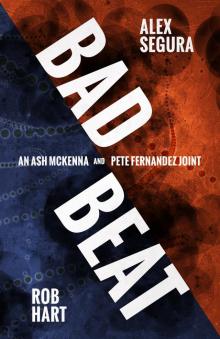 Bad Beat
Bad Beat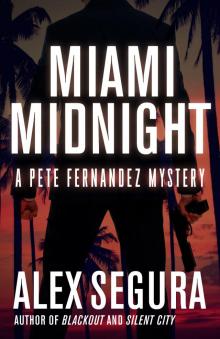 Miami Midnight
Miami Midnight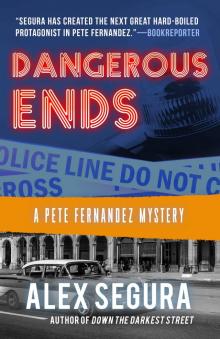 Dangerous Ends
Dangerous Ends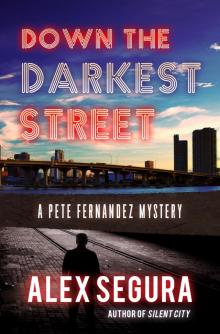 Down the Darkest Street
Down the Darkest Street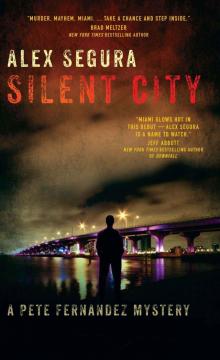 Silent City
Silent City